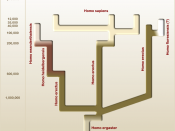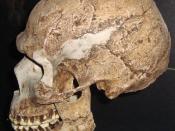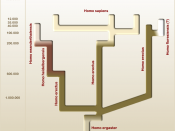Researchers say they may have discovered the mutation that caused the earliest humans to branch off from their apelike ancestors, a gene that led to smaller, weaker jaws and bigger brains. Smaller jaws would have changed the structure of the skull by eliminating thick muscles that anchored a huge jaw to the crown of the head. The change would have allowed the cranium to grow larger and led to the growth of a bigger brain capable of making tools and language. The mutation is reported in the latest issue of the journal Nature by a team of biologists and plastic surgeons at the University of Pennsylvania and the Children's Hospital of Philadelphia. The report provoked strong reactions throughout the field of human origins with one scientist saying it was "counter to the fundamentals of evolution" and another calling it "super."
The Pennsylvania researchers said their guess of when this mutation first occurred, about 2.4
million years ago, overlaps with the first fossils of prehistoric humans which have rounder skulls, flatter faces, smaller teeth and weaker jaws. The remarkable genetic difference continues to this day in every person. But nonhuman primates, including our closest animal relative, the chimpanzee, still carry the original big-jaw gene and thanks to stout muscles attached to the tops of their heads, they can bite and grind the toughest foods.
"We're not suggesting this mutation alone defines us as Homo sapiens," said Hansell Stedman of the University of Pennsylvania School of Medicine. "But evolutionary events are extraordinarily rare. Over 2 million years since the mutation, the brain has nearly tripled in size. It's a very intriguing possibility." University of Michigan biological anthropologist Milford Wolpoff called the research "just super." "The other thing that was happening 2ý million years ago is that people were beginning to make...


